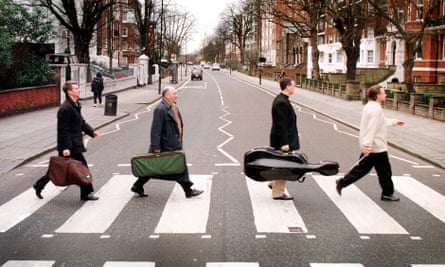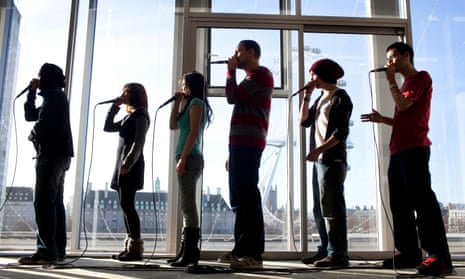Radio 3 – or the Third Programme, as it was called for its first two decades – is 70 years old on 29 September. Its founding father was William Haley, a former managing director of the Manchester Guardian, who became the BBC’s director general in 1944 and remade BBC radio for a peacetime world.
It would have three parts: the Light Programme, the Home Service and the Third Programme. His vision was that the nation’s culture was a “pyramid with a lamentably broad base and a lamentably narrow tip”. The Light covered “the lower third of the pyramid”. The Home was about the “middle third”. The Third was the pinnacle. The whole service was an attempt to raise the listener up that pyramid, from the dance music and comedy of the Light to the dizzy heights of Alban Berg and Dylan Thomas, of the Third. His ideas reflected his character and tastes. Unlike most of his colleagues, he had not been to university, but he was a ferocious autodidact who would gulp down three Victorian novels a week and resented going on holiday. according to Humphrey Carpenter’s excellent history of Radio 3, The Envy of the World
The Third’s first evening had its problems. There was a weak new piece by Benjamin Britten that he later disavowed, and a stilted talk by ex-servicemen; and only half the country was able to tune in. That was because the wavelength chosen was officially assigned to Latvia, and for months listeners complained about interference from Soviet programmes. (In fact, the Russians may have mischievously hurried to fill the previously empty wavelength, possibly tipped off, Carpenter speculated, by a Soviet spy close to the BBC.)
The Third failed, of course – at least on the terms that Haley had set. It did not create a nation of fans of the Darmstadt school. It never had mass appeal. What it did have, though, was an enormous impact on the minority who wanted to hear – among them postwar working-class kids such as Harold Pinter, Peter Hall and Peter Maxwell Davies, all of whom were to remember its profound influence on their formation as artists.
And herein lies the dilemma that has accompanied Radio 3 all its days. Should Radio 3 appeal to the many or the few? To what extent should it reach out to capture new audiences? What if that attempt is seen as a dereliction of its duty fearlessly to bring listeners the best, no matter how “difficult” it is?

In 1949 the composer Mátyás Seiber was arguing vigorously that if a work of art was good it should be broadcast, even if there were “supposedly too small an audience for it”. On the other side, the London Evening Standard was decrying the Third’s preference for the “obscure over the intelligible”. These days the argument is about whether reading out tweets and holding quizzes is a popularisation too far, and on the other side how the BBC can justify super-serving a small and already privileged audience, 42% of whom are over 65, according to the BBC Trust, 78% of whom are ABC1s and who are, by and large, also southern English and white. In fact, the argument about Radio 3 is a miniaturised version of the whole argument about the BBC.
Yet the debate, framed thus, is drastically out of date. The problem lies somewhere else. I am haunted by the dismissive phrase I once heard a composer use about the station. “Radio 3 is for appearing on, not listening to” – a cutting adaptation of Noël Coward’s famous quote about television.
But if a composer whose own work appears regularly on Radio 3 does not listen, isn’t that something of a problem? I sympathise with the position, because though Radio 3 has plenty of things and people I like on it, and I am profoundly grateful it is there, it does not feel like my natural home. The composers I know, in their 40s and younger, aren’t what you might call Radio 3 people either. They might be interested in clubbing culture and have an arcane and wide-ranging taste in pop music. (Anna Meredith, who has composed for the Proms, has indeed written a pop album.) Or they like sci-fi, or experimental theatre, or BBC 3 comedies such as Fleabag. They go to art exhibitions and the cinema and have been brought up on the immersive excitements of Tate Modern.
They might work with visual artists on the side, or write for film (think of Mica Levi’s exquisite score for Jonathan Glazer’s film Under the Skin). They might be interested in the politics of porn or of fourth-wave feminism. They might be dancing crazily at 4am in some club, and listening to a concert of Dowland songs the next evening. They might work with artists, they might well put on their own events outside the institutional circuit in disused car parks or bars. This is the ordinary world of composers under 50. Yet this kind of spirit is actually pretty hard to find on Radio 3.

It’s easy loftily to rewrite the whole of BBC radio from an armchair. Radio 3 is unlikely to become the sound equivalent of a cross between the Serpentine Gallery and the Berlin nightclub Berghain, and nor should it. The truth is that Radio 3’s particular identity is also entwined with, and symptomatic of, an entrenched culture of classical music and concert-going in the UK for which it cannot be held responsible.
Furthermore, if the bulldozers came for Radio 3, I would be lying in front of them. To my dying breath I would assert its fundamental importance to Britain and its profound contribution to the country – not just by way of the musical life it has supported and grown, especially through its commissioning of composers, but also through a significant relationship with drama and documentary. (Here I admit to a vested interest, since I am presenting a documentary, The Secrets of the Music Reading Panel, about an intriguing aspect of Radio 3’s history, as part of its 70th birthday celebrations., on 9 October.)
Yet I can’t help feeling that Radio 3 might follow the lead of the composers such as Anna Meredith a little more, to help it reflect a newer, freer culture of classical music that has slipped free of the old institutionalised habits and is approaching the world in completely different ways. One aspect of the early Third was the number of composers speaking on air – guiding the listener through their experience of, and love for, music’s rich history. Of course composers are constantly interviewed on Radio 3. But I’d like to see them make it – whether as programmers, presenters or creators of completely new ways of using the radio that we’ve never even heard of yet.
If the origins of Radio 3 lie in a desire to represent and make art at its most outstanding, I’d like to see it play with more new ways of making radio to create different forms:fresh and experimental means of doing journalism, say. I’d like to see a Radio 3 that was a playful, cheeky and disruptive force as well as a comforting one (I’ve always felt it’s had most vigour when it’s crashed outside the confines of its schedules, as when it played the complete works of Bach over a week). Radio 3 and the band of expert, passionate people who make it are not lacking in talent, creativity, energy and grace. They need to be unleashed.

